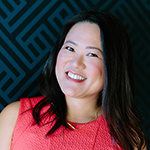I was talking to a mom friend today, who has two hapa daughters. She was telling me how her six year-old daughter remarked, “I’m Chinese and American!”
“No,” she corrected, “You’re Chinese and white. We’re ALL American.”
Which leads to me to an interesting observation. For as much as I ponder the significance of ethnicity and culture (this blog is called HapaMama, after all), I don’t explicitly give my children titles to put on their race.
Example #1: four year old recently asked my husband, “Are you and Mommy brother and sister?” When I finished laughing and caught my breath, I started to think about this. Doesn’t he realize that siblings generally sort of look alike? At least they are the same race. Maybe he doesn’t notice that everybody in Mommy’s family has black hair and brown eyes, and generally yellow undertoned skin. I’ve already noted (see Brown Haired Boy) that he went through a big self-conscious phase about his light haircolor, but I guess he doesn’t connect these physical traits to ethnicity.
Example #2: I was asking my seven year-old who his Sunday school teacher was. After questioning him on various descriptions (tall?short? long hair? or short?) I exasperatedly asked him, “Was she Chinese?”
“No silly, she’s not a language!”
So let me explain how we got here. I try not to make a big deal about race. Sure, I send my seven year-old to learn Mandarin. Our family goes to Taiwanese music and cultural performances. But my younger son also learned Spanish in preschool. My kids eat a variety of ethnic foods and we treat language and cultural traditions as different ways to communicate, something to learn to communicate with more people. (some of these people may look like you and may even be related to you). I try to emphasize that languages — along with food and other cultural traditions — are not just for the people of that place of origin to learn and enjoy. Perhaps that is why my older son chose to make a Hanukkah placemat in kindergarten!
As I type this, it seems very naive, in that melting pot, “We are the World” sort of way. Maybe it’s time to talk more specifically about matters of race and ethnicity with the kids. What do you think? Especially for those of you with bi-racial children — what do you do?

My kids are younger than yours, so we haven’t had to deal with this directly yet. It’s going to be interesting though, given that my son is practically my clone (I’m white) and my daughter looks so much like her Chinese dad that people ask me where I adopted her from. And my husband is Canadian, so we have to figure out how to reconcile his Hong Kong born Chinese-Canadianness with my 15th generation American totally mixed ethnic backgroundness and help our kids develop some sort of identity out of it!
Thankfully, we’re blessed to live in Seattle where mixed race kids are almost the norm, and the majority of our close friends are also in mixed culture families, so it’s not something out of the ordinary for our kids.
It is very difficult. Me being raised as a HAPA was difficult too. I’m half Filipino and half Spanish/French. Filipino mestizos do have a certain look to them, but I’d say about 98% of Americans don’t know what a “Filipino mestizo” looks like. So therefore, I get racially mis-judged all the time. Growing up I looked more European than Asian, so I never really told anyone and no one bothered to ask. My parents did tell me I was mixed, and I obviously knew since I was raised around my Filipino family and I was the whitest one on that side. It’s still Pretty difficult. Always having to explain yourself.
Thanks for that insight into your experience, Charissa. I always appreciate hearing from adult Hapas about their experiences… gives me perspective as to what mhy kids face.